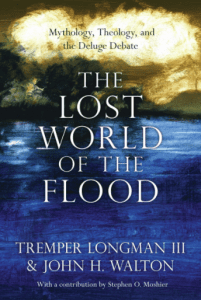 The next proposition in The Lost World of the Flood by Tremper Longman III and John Walton puts it on the line. The flood was a real, devastating, event that lived in human memory in the ancient Near East. But it was a local flood not a global flood.
The next proposition in The Lost World of the Flood by Tremper Longman III and John Walton puts it on the line. The flood was a real, devastating, event that lived in human memory in the ancient Near East. But it was a local flood not a global flood.
The author, narrator, of Genesis intentionally portrays the flood as a global flood making rhetorical use of hyperbole to convey an inspired and essential theological message.
The flood is used as a character in a story. As we read and study the story we are not called to consider the scientific feasibility of the flood, to search for geological evidence for the flood, to design a seaworthy boat capable of holding the necessary pairs of animals, or to identify the specific mountain on which the ark rests. This is colossal example of missing the point. Nor should we save the text by demonstrating that the author/narrator intended to describe a local flood. To do so diminishes the point the author was making through the intentional use of rhetorical hyperbole.
There are a number of significant elements to the story of the flood. One traditional interpretation of the flood story focuses on judgment, God’s judgment on sinful disobedience. This interpretation was developed in Jewish thinking and writing in the centuries leading up to the New Testament period. Echoes of this Jewish context and interpretation are found in New Testament references to the flood. An alternative interpretation focuses on the use of cosmic waters to obliterate disorder (evil and violence) and re-establish order in creation. These interpretations are not mutually exclusive and several ideas can be at play in the story. We should focus on the theological impact of the flood story and the way it is interpreted and used.
From Tremper and John:
The important point that we are making is that the literary-theological interpretation of the passage … takes precedence over the compulsion many feel to reconstruct the event itself. We contend, instead, the interpretation of the event by the biblical author takes pride of place and demands our intention as interpreters. (p. 95)
The New Testament authors used both the flood story and the Jewish interpretative tradition that had arisen over the last couple of centuries BC to make important theological points. Here too, the theological message takes precedence.
The New Testament writers have no independent access to the event. Their inspiration does not grant them insider information, only authoritative interpretation of the meaning of the flood event and its application. Furthermore, they may well pick up on something different in their interpretation of the flood to bring out a different perspective than what Genesis is doing. In other words, New Testament authors may repurpose an Old Testament account. (p. 96)
With respect to the argument that if Jesus (Mt. 24:37-39) and the New Testament authors “believed” the flood was global, who are we to dispute it …
The New Testament authors (and Jesus himself) are referring to the story in Genesis 6-9, which we have readily admitted, describes the flood in worldwide terms. We argue that the New Testament authors (and Jesus himself) were sophisticated enough to understand that (even if some modern readers are not). (p. 99)
There is no evidence that Jesus “believed” or “knew” the flood to be worldwide. There is only evidence in the Gospels that he used the flood story, well known to his audience, to make a theological point about judgment. It makes no difference whether or not Peter, Paul, or the authors of the Gospels thought the flood was global. The theological use of the story does not, in and of itself, eliminate the possibility that Genesis 6-9 uses rhetorical hyperbole to make a point.
Genesis is theological history and it is the theological interpretation that carries the message. Figurative language is used for impact and is not expected to be subjected to scientific study and validation. Frankly, such an approach is foreign to the day and age in which the story was told and the text was written.
I rather expect that Jesus would tell us to stop straining out gnats while swallowing camels.
Thoughts?
If you wish to contact me directly you may do so at rjs4mail [at] att.net.
If interested you can subscribe to a full text feed of my posts at Musings on Science and Theology.
















